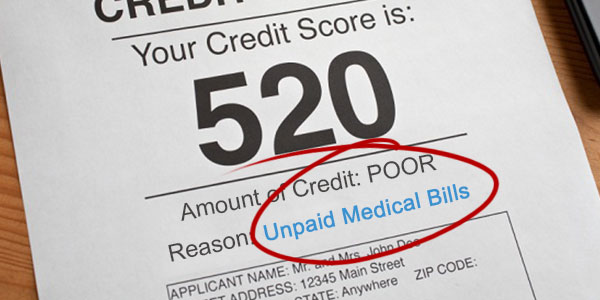As per the Consumer Financial Protection Bureau, almost half of all collection account on credit reports are due to unpaid medical bills. They are one of the primary reasons behind poor credit score for many people. Yes, medical debt can drop a person’s credit score from 50 to 100 points! Medical bills are burdensome, but ignoring them can be a severe financial mistake.
Do medical debts affect credit score?
Yes, it hurts your credit score. The reason is, the hospital authority and doctors directly assign the debt collectors for collection (to collect due medical bills) instead of informing the credit reporting agencies. So, the due unpaid medical bills will show on your credit report. This type of negative listings will remain on your credit report in next 7 years. As a result, your credit score will drop.
However, with time, the impact will fade away; but, the bad effect will impact your financial life significantly.
How to save your credit report from inaccurate negative listing of medical bills
If you don’t pay off your medical bills and the reporting is authentic, then you can’t do much. But, if you’ve paid the medical bills or your insurer has made the payment, but still, you get the negative listing, then there are some ways to get out of it.
Alert the credit bureaus
You should send a letter (dispute letter) to the credit bureau mentioning the inaccurate listing. But, before doing this, get credit reports of other two credit bureaus and check the reports carefully. If the other two credit reports are showing the same mistake, then dispute the error to the three credit reporting agencies.
Collect all the documents
Try to gather all documents of your payments and keep them safely. Visit your doctor’s office and ask for the payment records as well. Make photocopies of these documents and attach them with the dispute letter.
Stay in contact with the bureaus
As per the Fair Credit Reporting Act, the credit bureaus need to follow up on all credit reporting mistakes. So, it is advisable to stay in touch with the bureaus to know the status of your dispute.
Assess your health costs and keep aside money
You need to create an emergency fund besides a savings account. Pay attention to your health costs, just like you do with your other financial expenses, and put a certain amount of money into the emergency fund; or, opt for medical insurance to avoid costly medical debts. An emergency fund also helps you to get quality medical attention without overstretching your financial limits.
Negotiate to get discounts
If you undergo financial hardship, then talk to your doctor or hospital authority to get discounts on bills. Thus, the burden gets reduced and you’ll be able to pay the amount easily.
Get assistance of a billing advocate
You can hire a medical advocate to get assistance to manage overwhelming medical bills. A billing advocate helps by negotiating bills on behalf of the debtor. You’ll be charged a good amount of money, but this type of service is worthy as you’re getting professional help to manage your bills.
Stay connected to your medical insurance provider
You must know all the terms and conditions of your medical insurance. Also, call the provider and follow up whether or not the medical bills are covered by the policy.
Use an insurance calculator
Many online insurance calculators available on the internet. Compare yours costs on health services using such insurance calculator. Thus, you’ll be able to find out about the various medical options that you may need, you can compare rates on medical insurance premiums and deductibles.
Review your bills carefully
Make sure you are being charged only for the services that you had used. Don’t ignore medical bills, check them out before paying. You can check out if your insurance company had negotiated effectively with your health service providers as well.
Try to get medical benefits at your work
Many employers offer insurance coverage and discounts on health care programs, to their workers. If your company creates a health saving account for you, then make a contribution to it.
Final thoughts
Finally, you should take good care of yourself and your family to reduce health issues as much as possible. Also starting an emergency fund is very important to avoid medical debts. There are many people who do not even bother to save for health expenses. When the problem arises, they start feeling helpless. Moreover, if you don’t have any medical insurance yet, then try to get one. Also, know about the policy exclusions so that you can plan accordingly.
Don’t miss out: What are the collection rules for medical debts?









